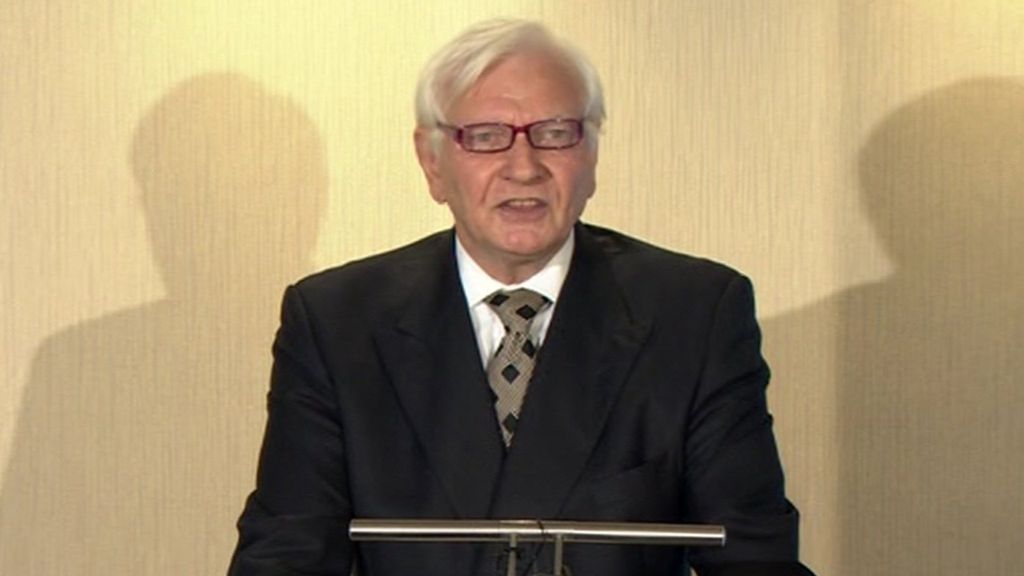The district judge who issued the search warrants for the raids on the homes of Harvey Proctor, Lord Bramall, and the late Lord Brittan which started the Metropolitan Police’s disgraced investigation into allegations of a Westminster paedophile ring claims to have been ‘misled’ by the police.
Writing in the Daily Telegraph, Howard Riddle who retired in 2016, also said he believed that the police had failed to follow standard disclosure proceedings when applying for the warrants. The former chief magistate said he had complete confidence in a report by Sir Richard Henriques’s damning report which concluded that the applications for the warrants had been ‘unlawful’.
‘Sir Richard concludes that I was correct in granting the warrants having regard to the information put before me,’ Riddle wrote. ‘However, he identifies a number of undermining factors that should have been drawn to my attention, but were not. Had they been, the report states, “it is inconceivable…that any application for a warrant would have been granted. The conclusion is that the search warrants were obtained unlawfully. It is obvious to me that Sir Richard has considered all the evidence put before him with great care. I have complete confidence in his report and its conclusions.’
In a coordinated sweep, the homes of the three men were raided. The Met sent 20 officers to Lord Bramall’s house, a man in his 90s who lived with his dying, now dead wife. Today, Proctor has written to the home secretary Priti Patel in the light of Riddle’s comments calling for an investigation by an outside police into ‘these serious allegations of criminality’.
‘Previously, I have called for the Metropolitan Police to appoint an outside police force to investigate these five former officers alleged by Sir Richard Henriques to have potentially committed acts of perverting the course of justice,’ he writes. ‘… Failure to institute such a criminal investigation will rightly be regarded as a continuation of a cover up.’
In his report Sir Richard said that the searches ‘should not have taken place and the warrants were ‘obtained unlawfully’. ‘Nick’s credibility was very much in question and he had not been consistent…I am satisfied the Senior Magistrate was misled,’ he added.
An Independent Office for Police Conduct (IOPC) report published on Monday exonerated the officers involved. In a furious response, Proctor said the publication of the IOPC Report had ‘shown conclusively’ that its investigation of Operation Midland was ‘a transparent stitch-up designed to reach only one possible conclusion, to exonerate the police officers involved’.
‘The IOPC’s conclusion that there was no case for the officers investigated to answer can only have been reached by a group of individuals who lacked both the capacity to conduct an effective investigation, and the desire to see proper scrutiny of the conduct of police officers,’ he continued. ‘The senior officers implicated – Deputy Assistant Commissioner Steve Rodhouse, and his immediate superiors – Assistant Commissioner Cressida Dick and her successor Patricia Gallan, were not even investigated.’
‘I may not look destitute – but I am’
When the Operation Midland team arrived at Proctor’s home, near Grantham, the former Tory MP had been living in relative obscurity working as private secretary to the Duke and Duchess of Rutland. In a 2016 interview for the Justice Gap, Proctor recalled the raid. The officers spent 15 hours searching his house and office. They seized photographs, papers and archives from his 1987 case, confiscated telephones, iPads and laptops and even bagged up his sleeping tablets for later inspection.
‘Just before they left I said to the officers: “Is this likely to be in the newspapers?” They said no,’ he recalls. However a journalist from the now defunct investigative news site Exaro, through which Nick first made his allegations, put in a call to his office asking to confirm details of the raid two hours before they left.
The following morning Harvey Proctor was on BBC Radio 4’s Today programme telling presenter James Naughtie that he was not in ‘any rent boy ring’.
Three weeks later, he had lost his home, job and future security.
‘I may not look destitute, but I am,’ he told me. ‘I have no money. I have no assets.’ If it wasn’t for the support of friends, Proctor claimed he would have ended up homeless. ‘I have a roof over my head for my partner and my dogs,’ he said; adding that his new home was nothing more than ‘a glorified shed’. ‘It is an outbuilding on a farmhouse away from the house. There is no running water,’ he added







